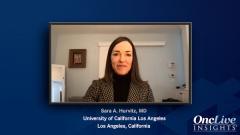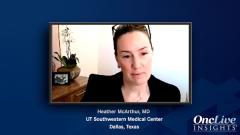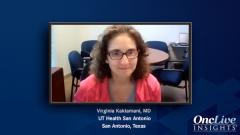
Overview on Treatment Options for HER2+ Breast Cancer
Expert panelists provide a broad overview on HER2+ breast cancer and review the evolving treatment armamentarium.
Transcript:
Aditya Bardia, MD, MPH: Welcome to the next section, “HER2 low: A New Treatment Opportunity.” Before we talk about HER2 low, let's start with HER2 positive or HER2-amplified metastatic breast cancer. [There’s a] lot of interest in trastuzumab deruxtecan [T-DXd]. Sara, could you review the data behind DESTINY-Breast02 and DESTINY-Breast03? How are you using trastuzumab deruxtecan for a patient with metastatic HER2-positive breast cancer?
Sara A. Hurvitz, MD: Trastuzumab deruxtecan had a lot of recent data presented and published. [It’s a] very exciting antibody-drug conjugate [ADC]. It first hit the scene in the single-arm phase 2 DESTINY-Breast01 clinical trial, which was presented at the 2019 San Antonio [Breast Cancer Symposium] showing a really impressive progression-free survival [PFS] as well as objective response rate of around 60% in very heavily pretreated patients with HER2 positive metastatic breast cancer. And while that led to the accelerated approval of T-DXd for metastatic HER2 positive disease in the later-line setting after at least 2 prior lines of therapy, it certainly required confirmation.
At San Antonio, Ian Krop, MD, PhD, presented the results of DESTINY-Breast02, which was the phase 3 clinical trial providing confirmation in a phase 3 setting of the results with T-DXd. In this study, patients were randomized 2:1 to receive T-DXd or trastuzumab plus capecitabine or lapatinib plus capecitabine per investigator choice. Patients had to have been previously treated with T-DM1, the original approved ADC for metastatic HER2 positive breast cancer. This is a post–T-DM1 patient population. The study enrolled patients who had received a median of 2 prior lines of therapy. But this is a heavily pretreated patient population, with about a third of patients having received 3 prior lines of therapy for metastatic disease.
The study was positive. It showed a significantly improved progression-free survival, hazard ratio of 0.36, 17.8 months for T-DXd vs 6.9 months for T-DM1, and benefits seen regardless of the subgroups analyzed. Overall survival was also significantly improved, with the hazard ratio of 0.66, 39.2 months median PFS in this heavily pretreated setting. This is quite impressive for the heavily pretreated setting, which compared favorably with the treatment of physician's choice of just over 2 years. And about 70% of patients with T-DXd had an objective response compared with 29% of patients with treatment of physician's choice. This solidly placed T-DXd in that setting to be used after T-DM1.
However, last year in ESMO 2021, [European Society of Medical Oncology meeting] the DESTINY-Breast03 data were presented. This was the first trial to be presented, which was randomized data comparing T-DXd with TDM1. In this study, the requirement was that patients had previously received trastuzumab and a taxane, and they were randomized to T-DXd or T-DM1. A good percentage of patients were being treated in the second line setting or third line setting or beyond. It’s a little less heavily pretreated than DESTINY-Breast02. The study demonstrated a statistically significantly improved progression-free survival in favor of T-DXd.
At the time of original reporting, the median PFS hadn't been reached for T-DXd and was around 6.8 months for T-DM1. At the San Antonio update in 2022, the median PFS was just under 29 months for T-DXd and still around 6.8 months for T-DM1. And at that updated analysis, the median overall survival was reported and was significantly in favor of T-DXd, with a hazard ratio of around 0.64. The median OS hadn't been reached for either arm but was in favor of T-DXd, and the objective response rate was just under 80%. This is practice-changing data that solidly places T-DXd as the gold standard therapy in the second-line setting and beyond. For patients of mine whose disease is progressing on THP [docetaxel, trastuzumab, pertuzumab]–based frontline therapy, my treatment of choice is T-DXd. And if they are already on second- or third-line therapy and doing well at the time that they progress, T-DXd would be my treatment of choice.
Aditya Bardia, MD, MPH: I agree, and I think there's uniform consensus that T-DXd should be the second-line treatment option in HER2-positive metastatic breast cancer until we get results from additional studies. The question is about patient with brain metastasis. If a patient has brain metastasis in the second-line setting, would you consider T-DXd vs tucatinib, capecitabine, trastuzumab, or some other option? Heather, what are your thoughts about this subgroup of patients who have brain metastasis? What would be your preferred option?
Heather McArthur, MD: It's increasingly complicated, and it depends in part on what's happening with their non-CNS [central nervous system] disease. Whether that is being controlled with the current regimen or not, it depends on the extent of the metastases and whether they're symptomatic. It's worth pointing out that ASCO [American Society of Clinical Oncology meeting] recently released 2022 guidelines that are helpful and informative, because these decisions are increasingly complicated. And these are guidelines to guide treatment decisions around HER2+ breast cancer brain metastasis specifically. It’s a tailored treatment recommendation to the individual in the clinical situation.
Transcript edited for clarity.







































